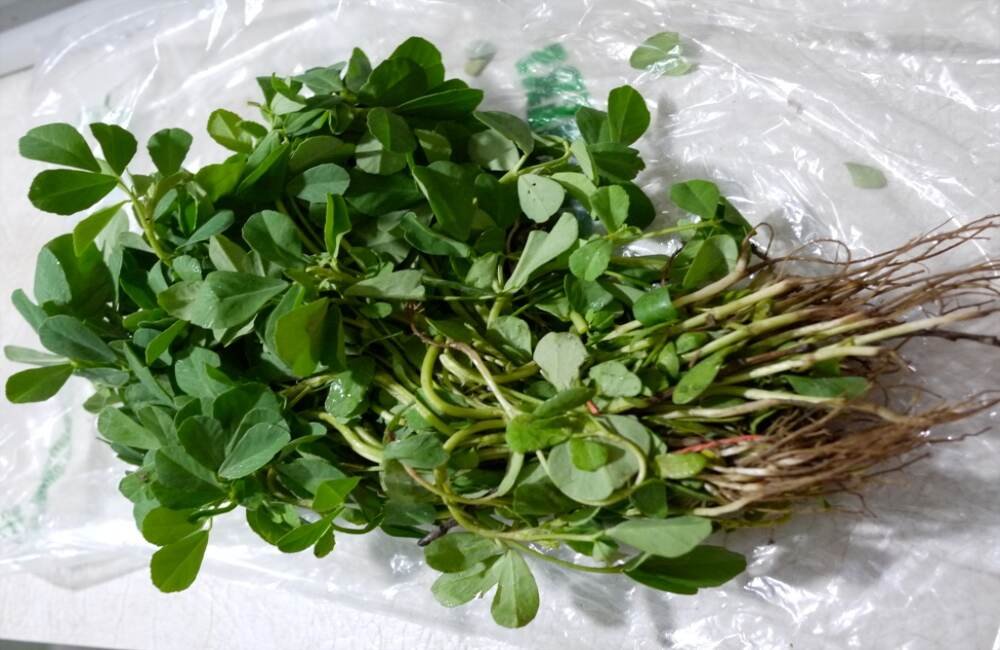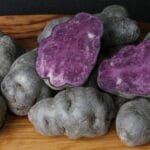Ashu’s Curiosity
Ashu’s mother prefers to add methi seeds or fenugreek seeds to most of her recipes for flavour and taste. But Ashu doesn’t like them because they are quite bitter when eaten alone.
But one day his mother prepared Aloo Methi, a leafy green recipe that contains methi leaves as its main ingredient.
His mother told him that there are many health advantages of methi leaves and he should consume these leaves because they are more nutritious than the fenugreek seeds.
But he wants to know more about the health benefits of methi leaves and for that, he should visit Know Ur Diet. Let us see what he finds there:
What are Methi Leaves?
Methi leaves or Fenugreek leaves come from the fenugreek plant which is part of the larger legume or bean family. Leaves and seeds from the plant have been part of cuisines and traditional medicines for centuries.
Methi leaves have a slightly bitter and nutty taste compared to seeds that are more bitter and somewhat tangy in flavour.
Read more about: Fruits & Vegetables
Origin of Methi leaves
Although methi leaves are an integral part of Indian cuisine, you will be surprised to know that methi was first cultivated in the regions of the Mediterranean and West Asia as early as 4000 BC.
Even the English name methi which is fenugreek means “Greek Hay” in Latin.
Nutritional content of Methi Leaves
Let us discuss nutrition in 100g of methi leaves:
| Nutrients | Quantity |
|---|---|
| Energy (Calories) | 323 kcal |
| Fat | 6.41g |
| Carbohydrates | 58g |
| Dietary Fiber | 24.6g |
| Protein | 23g |
| Iron | 33.53mg |
| Calcium | 176mg |
| Sodium | 67mg |
| Potassium | 770mg |
| Copper | 1.11mg |
| Magnesium | 191mg |
| Phosphorus | 296mg |
| Zinc | 2.50mg |
Source: www.netmeds.com
Health Benefits of Methi Leaves
As we have mentioned above there are several health benefits of fenugreek leaves, let us discuss some of them here for better understanding:
Warmth to the Body
Our list of health advantages of methi leaves begins with mentioning that you should consume methi leaves in the winter season because of their warm nature. Methi leaves contain compounds that are critical to generating internal heat in your body.
In Indian households, recipes from fenugreek seeds and leaves such as methi paratha and methi laddu are quite common in the winter season.
Boosts Immunity
If you want to strengthen your immune system to protect yourself from winter illnesses then you should add methi leaves to your meal plan. These leaves are a rich source of Zinc, a mineral that is needed to boost the growth of white blood cells.
Other Vitamins in these leaves such as Vitamin A, Vitamin C & Beta-carotene are helpful in reducing the impact of free radicals on the body cells.
Improves Digestion
Fenugreek leaves are also a great source of dietary fibers. These fibers are essential to maintain the unhindered movement of stool out from the body. They are also helpful in avoiding gut-related health problems like constipation, bloating and indigestion.
Dietary fibers promote the growth of gut bacteria in the intestine. These bacteria can provide better absorption of nutrients and minerals in the blood cells in the stomach.
Reduces Inflammation
You can include methi leaves in your diet if you are regularly suffering from inflammations. Fenugreek has anti-inflammatory properties that can help you avoid inflammations on the vital body parts.
These leaves are especially helpful for those suffering from joint pains and swelling during the winter season. You can take methi leaves soup in the evening to tackle the problem of inflammation.
Controls Blood Sugar
Some minerals and bioactive compounds in methi leaves such as Potassium and Magnesium are effective in controlling blood sugar levels. These minerals stimulate the release of insulin in the bloodstream.
Dietary fibers in fenugreek leaves prevent sudden spikes in blood sugar levels. Fibers maintain the glucose level in the body by making you feel satiated for a long period.
Aids in Weight Loss
If you are aiming to put down some weight then you should include methi leaves in your diet. There are multiple advantages of methi leaves for weight loss such as dietary fibers. This can help you to avoid high-calorie foods, while these leaves are low in calories.
Studies have found that those who include methi leaves recipes in their diet have reduced calorie intake by 10-15% in the same meal.
Prevents Cancer
Cancer is a rapidly rising health concern throughout the world. But you can prevent the chances of developing cancer by adding methi leaves to your meal. Fenugreek leaves contain compounds like saponins that have anti-cancer properties.
There are certain studies that have shown methi leaves can reduce the chances of having colon and prostate cancers.
Strengthens Bone
Minerals in methi leaves such as Calcium and Magnesium are effective in maintaining the health of bones. These compounds are useful in strengthening bones against fractures and other bone-related disorders.
Consuming methi leaves can also help in preventing bone diseases like Arthritis and osteoporosis.
Increases Male Fertility
Our list of health benefits of fenugreek leaves can’t be complete without mentioning that fenugreek can help in promoting male fertility. Compounds in it can increase the secretion of testosterone and sperm production.
Males who are suffering from infertility should include these leaves to improve their overall reproductive health.
Prevents Kidney Stone
By eating methi leaves, you can significantly lower the risk of having kidney stones. Not only that, the anti-inflammatory properties of methi can avoid the accumulation of salts in the kidney.
Also, antioxidants in these leaves such as flavonoids and saponins are effective in reducing oxidative stress on kidneys. They can also lower the risk of kidney cancer as well.

Methi Leaves Benefits for Skin & Hair
There are multiple health advantages of methi leaves. Eating these leaves can help to avoid skin inflammations. Along with that, Vitamin C in fenugreek leaves stimulates the production of collagen. This is helpful in enhancing the skin elasticity and improves skin tone.
These leaves are also beneficial in hair growth and maintaining hair shine. Also, eating them can prevent dandruff & premature greying of hair. Some studies have shown that compounds in methi leaves can repair damaged hair follicles.
Methi Leaves Benefits for Women
Methi leaves have several benefits for women, especially for those who are breastfeeding newborns. Some studies have indicated that fenugreek leaves have properties that increase lactation in women.
Bioactive compounds like diosgenin and phytoestrogen are helpful in this because they are similar to the impact of women’s hormones estrogen. Also, they can promote female fertility if consumed regularly.
Uses of Methi Leaves
After discussing these health benefits of fenugreek leaves, let us discuss some uses of these leaves in our daily lives:
In Cuisine
There are multiple recipes or dishes you can prepare by using these leaves. Enjoy them for breakfast, lunch & dinner as a main dish or a side dish. Some common methi leaves recipes are methi paratha, methi laddu and aloo methi.
In Industrial use
Dehydrated methi leaves are widely consumed by the urban population by crushing in methi leave powder. This phenomenon is getting popular because powder form is easy to include and treated as spices in cooking.
In Traditional Medicines
Indian traditional medicine system, Ayurveda emphasises the effectiveness of methi leaves in treating health problems associated with digestion and inflammation. Due to this, these leaves are used to prepare Ayurvedic medicines as well.
Side Effects of Methi Leaves
Although Methi leaves have several health benefits, they should be consumed in moderation. Consuming more than recommended quantities can lead to certain side effects. Some of these are:
Digestive Issues
Dietary fibers are essential for digestive health but over-intake can lead to health risks as well. If you eat methi leaves in more than expected quantities then you might suffer from bloating, diarrhea and even vomiting.
Allergic Reaction
Although there are rare chances, some people experience allergic reactions to the methi leaves. Symptoms of this include swelling, itchiness, rashes and even breathing difficulty.
Risk for Pregnant Women
Minerals and nutrients in methi leaves are helpful in the development of foetus but over-consumption of methi can also develop complications and lead to miscarriage. So, a pregnant woman should consult the doctor before including methi leaves in their diet.
Conclusion
Ashu has decided that he will include methi leaves in his meals because of its several health benefits. The health advantages of methi leaves are numerous and it is a rich source of multiple minerals and vitamins.
But at the same time, there are certain side effects of methi leaves if you consume them more than the recommended quantity. Some of these health risks are allergic reactions, digestive issues and chances of complications for pregnant women.




